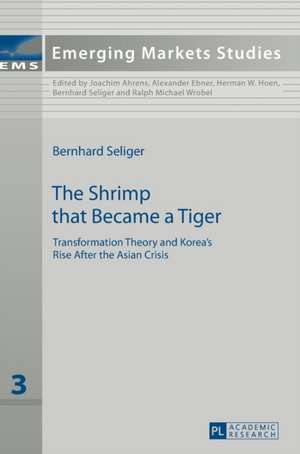The Shrimp That Became a Tiger: Transformation Theory and Korea's Rise After the Asian Crisis: Emerging Markets Studies, cartea 3
Autor Bernhard Seligeren Limba Engleză Hardback – 29 iul 2013
Preț: 570.57 lei
Preț vechi: 741.00 lei
-23% Nou
Puncte Express: 856
Preț estimativ în valută:
109.18€ • 113.99$ • 90.36£
109.18€ • 113.99$ • 90.36£
Carte tipărită la comandă
Livrare economică 04-18 aprilie
Preluare comenzi: 021 569.72.76
Specificații
ISBN-13: 9783631607381
ISBN-10: 3631607385
Pagini: 353
Dimensiuni: 154 x 217 x 24 mm
Greutate: 0.58 kg
Ediția:Nouă
Editura: Peter Lang Gmbh, Internationaler Verlag Der W
Seria Emerging Markets Studies
ISBN-10: 3631607385
Pagini: 353
Dimensiuni: 154 x 217 x 24 mm
Greutate: 0.58 kg
Ediția:Nouă
Editura: Peter Lang Gmbh, Internationaler Verlag Der W
Seria Emerging Markets Studies
Notă biografică
Bernhard J. Seliger is the resident representative of the Hanns Seidel Foundation in Korea. In 2007, he habilitated at the University of Witten/Herdecke. From 2004 to 2006 he was guest professor at the Graduate School of Public Administration of Seoul National University and at the Graduate School of International Area Studies of Hankuk University of Foreign Studies. From 1998 to 2002 he was Assistant Professor at the Graduate School of International Area Studies of Hankuk University of Foreign Studies. He received his doctorate in 1998 at the University of Kiel.
Cuprins
Contents: The institutional challenge to transition theory - Toward a more general theory of transformation - The Korean Financial and economic crisis - Central Bank independence in Korea - FDI and cognitive models - External institutions and the international integration of Korea - From Ethnocentrism and Cultural Nationalism to Globalization and Hallyu (Korean Wave).









